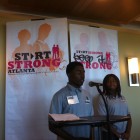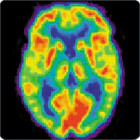
Start Strong Shares Ideas to Stop Dating Violence Before it Starts
|
Sometimes the solution to a very big problem is to prevent it from occurring in the first place. That’s the theory behind Start Strong, a national program designed to defeat teen-dating violence by helping middle-school kids learn how to avoid unhealthy relationships. “I didn’t even know I was in an abusive relationship,” says Nija Nelson, who says her former boyfriend yelled at her and called her names. “Most teens don’t recognize the other kinds of abuse besides physical abuse. Start Strong helped me realize that the relationship I was in was unhealthy.”
Now, Nija is an Atlanta high school senior and a Start Strong “Youth Leader” who talks to middle school kids about teen-dating violence.
